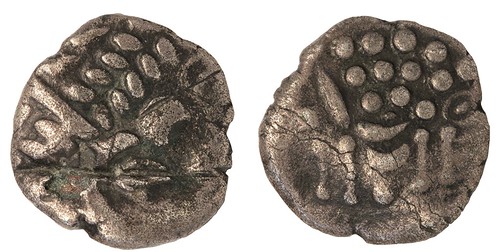
PREV ARTICLE
NEXT ARTICLE
FULL ISSUE
PREV FULL ISSUE
RITUALLY-KILLED COINS?Bob Van Arsdell writes: "I enjoyed the Money People Hated article last week. "In Celtic societies, these kind of coins are often called "ritually killed". "Last year I published an article about this, exploring whether there was any sort of ritual involved. The idea that people were damaging coins to send messages was also discussed. It describes various kinds of damage and the likely causes."
Thanks. Here's a short excerpt - see the complete article online. -Editor

Semiotics of Celtic Coins XV – People Breaking Things
Ritually-killed coins?

Philip de Jersey's 2005 paper on defaced coins recorded two other Durotrigan hoards with damaged coins: Upton (Nursling) 1995 and a second hoard also thought to have been found at Nursling in 1997. In 2014, he sensibly suggested that the 1995 parcel was a scatter of coins disturbed by plowing and the 1997 parcel was the undisturbed portion buried below plow-level. It now appears that another hoard with defaced coins may have been found eight years before the Upton hoards. The passage of time makes it unlikely we will ever be able to identify more of the coins, or establish that a hoard was indeed found. The term "ritually-killed" is laden with emotional connotations such as "savage religious rites" and "violence". It should be dropped if we are to appraise the coins in a sensible manner. The fact that the term is so attractive is worth scrutiny. Where did it come from? More to the point, what does it tell us about human behavior? Were people trying to "send a message" – is something semiotic going on?
To read the complete article, see:
To read the earlier E-Sylum article, see:
Wayne Homren, Editor The Numismatic Bibliomania Society is a non-profit organization promoting numismatic literature. See our web site at coinbooks.org. To submit items for publication in The E-Sylum, write to the Editor at this address: whomren@gmail.com To subscribe go to: https://my.binhost.com/lists/listinfo/esylum All Rights Reserved. NBS Home Page Contact the NBS webmaster 
|